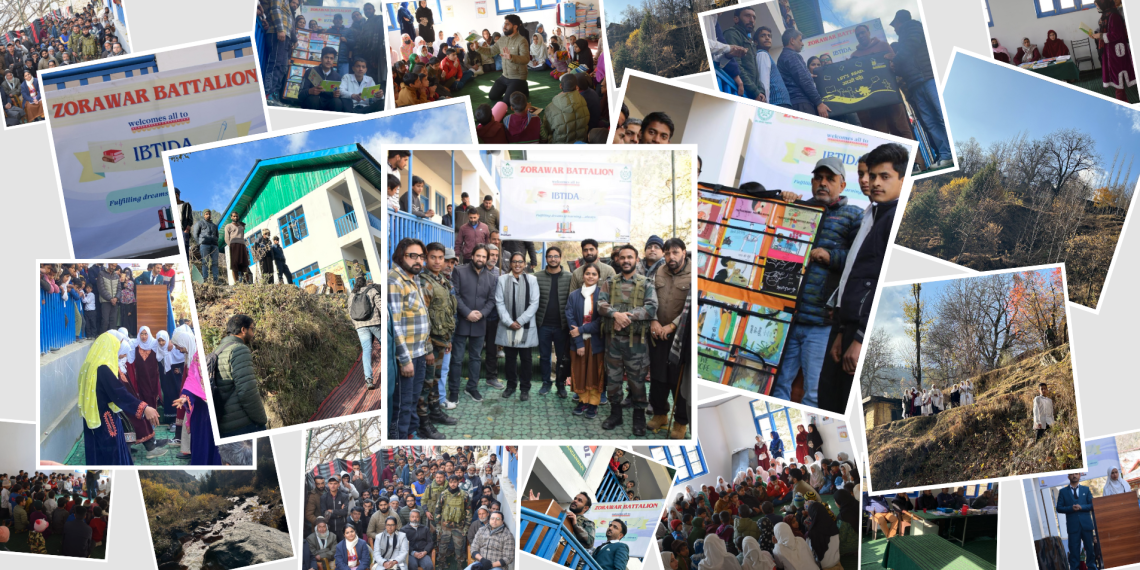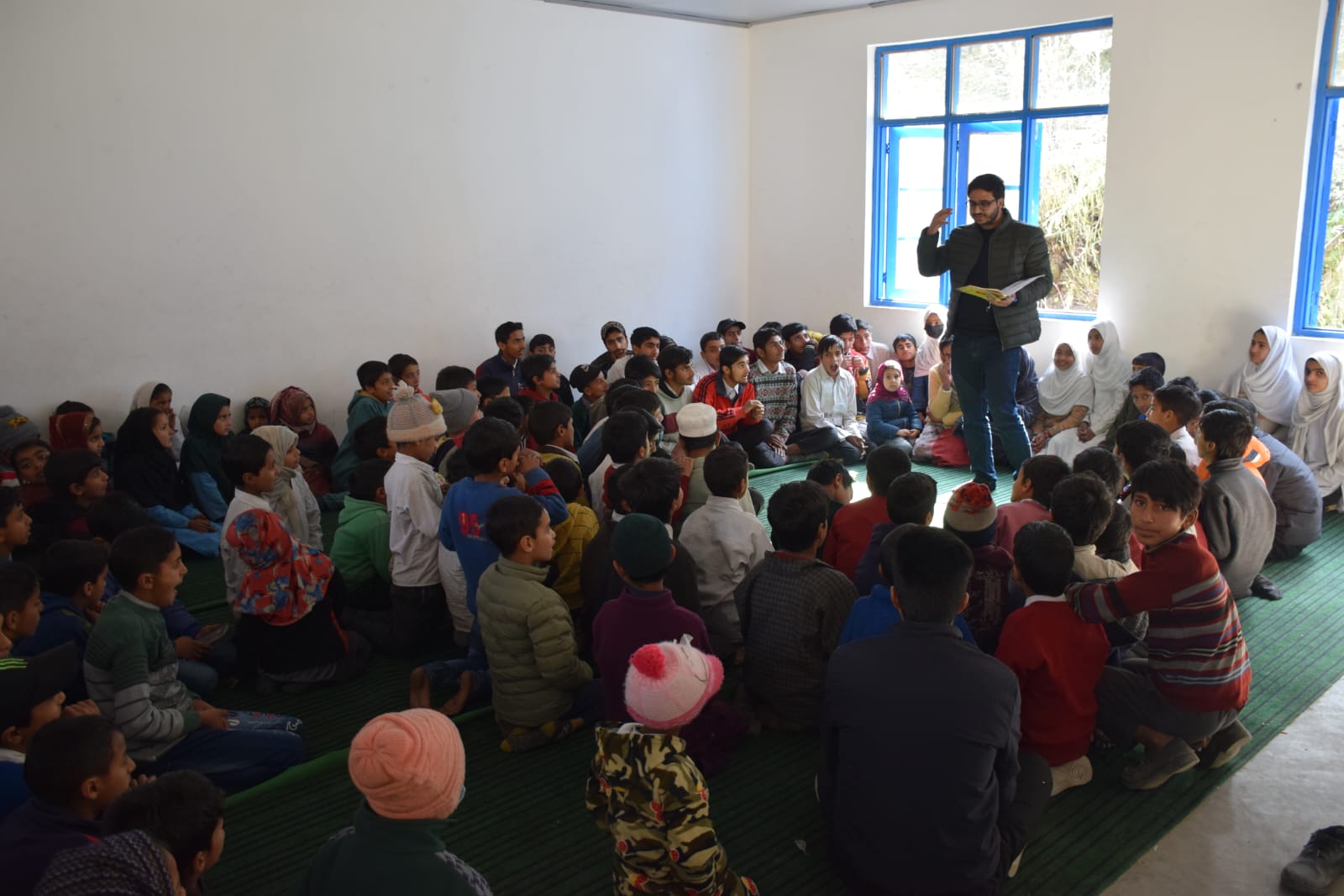Ibtida: The Beginning of a Lifetime of Learning
- by Donate-a-Book
- in Jammu & Kashmir

In Zamboor Pattan’s remote valley near Uri, amidst snowy peaks by the Line of Control, children held storybooks in their mother tongue, Urdu, for the first time. This is the story of the campaign that provided libraries for ten schools in the valley.
The story starts with a serendipitous moment, when Avantika Srivastava, the passionate organiser, met our lead for Donate-a-Book Malathi, through Ravi Menezes of Goobe’s book store. She was scouting for a way to set up libraries in Uri- anchored by the support extended by 16th Battalion, The Rajputana Rifles of the Indian Army serving in that area.
The Pratham Books team got into a conversation with Avantika about what inspired her to start this campaign, and how anyone can take up the initiative to spread the joy of reading with those who need it most.
Avantika Srivastava who is studying at The Takshashila Institution, is a seasoned social development professional, and has worked in aspirational districts of India as a Gandhi fellow. She is grateful to Mr. Aman Negi who supports constructive endeavours which improve life chances esp. through education for making the initial introduction with Major Abhilash Sharma of 16th battalion, the Rajputana Rifles.
Can you tell us more about yourself, and what led you to set up this library?
In my academic journey, I integrated science and social entrepreneurship, realising the transformative impact of providing the right support in the right way to empower individuals. This perspective led me to the Gandhi fellowship, where I worked for the Aspirational Districts transformation program, focusing on improving developmental parameters like health, education, livelihood, financial inclusion in underserved areas. The experience revealed that a synergy between government, community, and private organisations has the power to bridge the resource and action gap. This insight motivated me to address resource inequalities esp. in education. I continued to serve through various avenues, and the self-starter nature dawned light onto Ibtida.
The initiative, Ibtida, was aligned with Operation Sadbhavana, programme by the Indian Army aimed at societal welfare through developmental programs since 1997.
Major Abhilash observed a lack of amenities, especially in public schools, hindering students’ motivation and engagement in the region. We both planned this collaboration to address the dearth of resources and low community alignment and decided to take a step to empower children who live in difficult terrains like Uri with storybooks.

What was your favourite moment through the journey of this campaign?
The whole journey has been a real joy, honestly. It’s tough to pick just one favourite moment because they’re all special. If I had to narrow it down, launching the Donate-a-Book campaign stands out. It was so heartwarming to see our discussions turn into a tangible campaign, accessible to many. Taking that personal initiative, understanding the cause, and having the whole team, including Malathi, rally behind us—it was touching. Their sensitive approach made it all happen in a way that felt really special. Without that support, it wouldn’t have been the same.
What are your favourite children’s reactions to the library?
We were treated with surprise from the children and their teachers who had planned performances of different activities: speeches, folk songs and dances , recitals, and more. It was so beautiful to watch the children perform, and see how it boosted their confidence.
Another favourite part was to see the children open the Urdu books and confidently flip through the pages. The initial hesitation to read in a foreign language was overcomed because It was the book that did the talking and not anything else and I can confidently say that the children really enjoyed reading them.
Some of these children, teachers and parents have walked a few kilometres uphill to reach the school for this event. And while we were going back I remember seeing this one teacher carrying the portable library, which weighs around 10 kgs, down the hill back to his school. That image is going to stay with me for a long time.
The established library consists of 50% Urdu, 40% English, and 10% Hindi storybooks. What factors influenced the selection of languages for the books?
The focus was on piquing the interest of children and teachers so that they engage the maximum with the books. We were trying to keep the maximum composition of books in Urdu and English because they were the medium of instruction in these schools and – (a mixture of kashmiri, pahari and urdu is predominantly spoken language in the region).
What would you say are the key learnings you’d like to share with others who might want to set up similar campaigns?
I would definitely say, have multiple conversations with stakeholders to understand their situation, their requirements, and their languages, for better engagement with children. A child’s reading level is subject to their location and their exposure which may not always match the standard reading levels set for an age. So always talk to teachers, parents and local facilitators to better determine their needs.
Another thing is, to tap into local organisations, and co-create with the stakeholders working there. Getting their buy-in will help the children get most of the resources you are setting up. We are now working with the community librarians and teachers to help them explore how to best use the libraries. On the day of the launch, we had two storytellers from the Srinagar office of Pratham Education Foundation to conduct storytelling sessions and activities in Urdu in order to pique the interest of the children, and demonstrate to the teachers how the portable library could be used. Engaging with the communityIs important for the effective utilisation of the library!

Lastly, to Major Abhilash Sharma- why did you choose to work with Donate-a-Book for setting up this library?
The society functions on mutual cooperation and interdependence on each other.
Everyone has a role to play in creating a better environment, especially for the children who are the future. It’s praiseworthy and heartwarming to see Pratham Books doing their part.The child-centric books they have made covering multiple contexts and languages is commendable, initiatives like Ibtida bring the nation together and forge a better society for children.
Donate-a-book is currently running campaigns that help individuals and communities to set up libraries for children – Support them now, and gift the joy of reading to a child!



